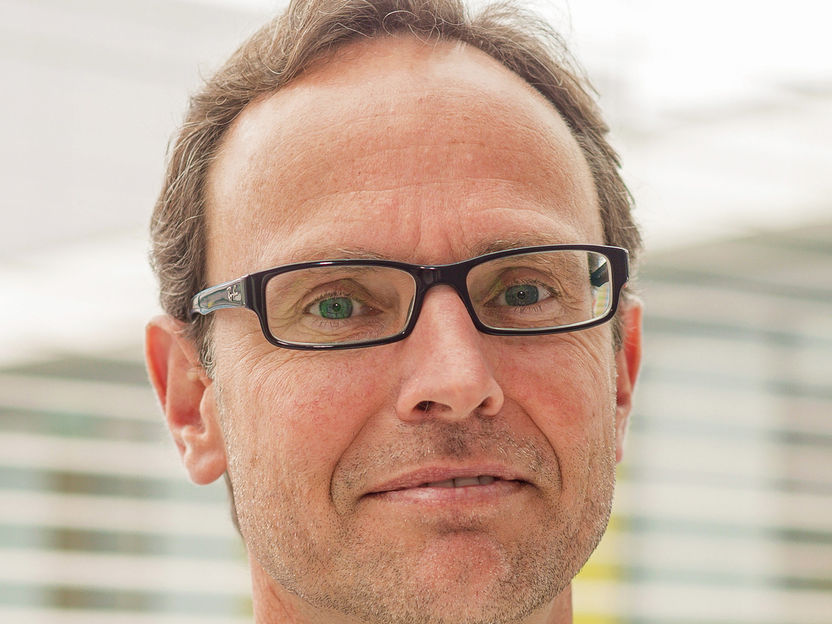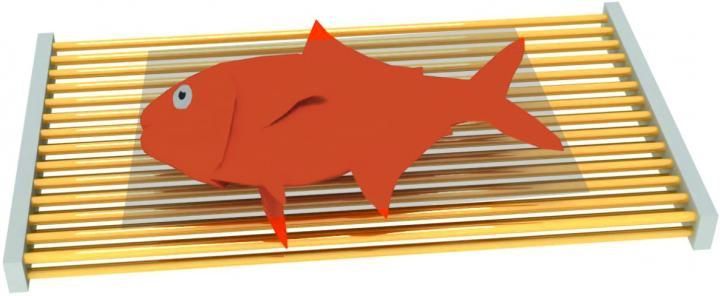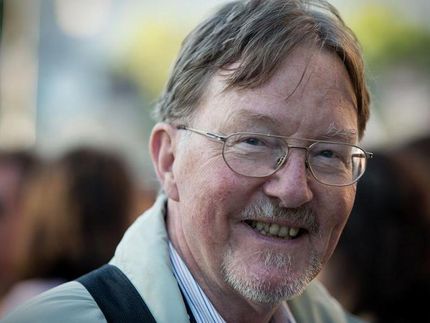Leibniz Prize for chemist Prof. Dr. Peter R. Schreiner
Germany's most important research funding prize goes to scientist at the University of Giessen
Chemist Prof. Dr. Peter R. Schreiner from the Institute of organic chemistry at Justus Liebig University Giessen (JLU) has been awarded the Gottfried Wilhelm Leibniz Prize 2024 by the German Research Foundation (DFG). The award, which is endowed with 2.5 million euros, is considered the most important German research funding prize and is awarded once a year to outstanding scientists. According to the DFG, Prof. Schreiner, holder of the Liebig Chair at JLU, received the award "for his outstanding work in physical-organic chemistry, with which he has made groundbreaking contributions to reaction control". Through his research, he has had a lasting influence on the overlapping areas of organic, physical and theoretical chemistry.

Prof. Dr. Peter Schreiner is Leibniz Prize winner 2024.
JLU/Katrina Friese
"With Prof. Schreiner, whose professorship is directly linked to our namesake Justus Liebig, we are honoring a scientist who already enjoys the highest international reputation and at the same time has considerable potential for further groundbreaking research," commented Prof. Dr. Katharina Lorenz, First Vice President of JLU, on the news announced by the DFG on Thursday following the meeting of its Joint Committee. "In addition to his research, Prof. Schreiner is particularly committed to JLU and is actively involved in shaping many of our international partnerships. I congratulate him wholeheartedly on this well-deserved award."
Prof. Schreiner himself emphasized: "The award recognizes and underlines in a special way the many creative moments and the hard work of my staff over the last 25 years or so. I am overjoyed to accept this award on behalf of everyone and am looking forward to what lies ahead."
The award winner's work has had a lasting impact on several areas of organic chemistry in recent decades. He was one of the first chemists to recognize the broad potential of thioureas in organocatalysis. His fundamental work is of great importance for this field of research. The "Schreiner catalyst" is used in many laboratories around the world. The chemist and head of the Institute of Organic Chemistry conducts research in the field of metal-free catalysis, nanodiamonds and quantum mechanical tunneling to develop and improve sustainable chemical methods. The new chemistry building and the establishment of the Center for Materials Research a few years ago provide the renowned scientist with ideal research conditions.
Prof. Schreiner is a member of the German National Academy of Sciences Leopoldina and the Berlin-Brandenburg Academy of Sciences and Humanities. His research work has been recognized and funded many times, for example with the Adolf von Baeyer Medal of the German Chemical Society (2017) and an ERC Advanced Grant (2022). From the American Chemical Society (ACS), he received one of the highest US prizes for organic chemistry, the Arthur C. Cope Scholar Award 2021. Prof. Schreiner has earned an outstanding scientific reputation with almost 500 publications in renowned international journals (including "Science" and "Nature"). After studying chemistry at the University of Erlangen-Nuremberg and in the USA, the Nuremberg-born scientist received his doctorate in both organic chemistry (Erlangen, Dr. rer. nat.) and theoretical chemistry (Computational Chemistry, USA, University of Georgia, Athens, Doctor of Philosophy).
He has been Professor of Organic Chemistry at JLU since 2002. Prof. Schreiner was a member of the Presidential Board as Vice President for Research and Promotion of Young Scientists from 2012 to 2015 and is a member of the University Senate.
The aim of the DFG's Leibniz Program, which was established in 1985, is to improve the working conditions of outstanding scientists, expand their research opportunities, relieve them of administrative workloads and make it easier for them to employ particularly qualified younger scientists. The decision on the award winners is made by the DFG's Main Committee on the basis of a recommendation from the Nomination Committee for the Leibniz Program. The prize money is to be used by the Leibniz Prize winners within seven years for specific projects, including the promotion of young researchers.
Note: This article has been translated using a computer system without human intervention. LUMITOS offers these automatic translations to present a wider range of current news. Since this article has been translated with automatic translation, it is possible that it contains errors in vocabulary, syntax or grammar. The original article in German can be found here.
Topics
Organizations
Other news from the department science

Get the chemical industry in your inbox
By submitting this form you agree that LUMITOS AG will send you the newsletter(s) selected above by email. Your data will not be passed on to third parties. Your data will be stored and processed in accordance with our data protection regulations. LUMITOS may contact you by email for the purpose of advertising or market and opinion surveys. You can revoke your consent at any time without giving reasons to LUMITOS AG, Ernst-Augustin-Str. 2, 12489 Berlin, Germany or by e-mail at revoke@lumitos.com with effect for the future. In addition, each email contains a link to unsubscribe from the corresponding newsletter.
Most read news
More news from our other portals
Last viewed contents
Category:Periodates
Caesium-134
Gene_expression




























































